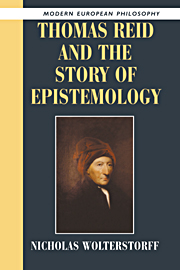Book contents
- Frontmatter
- Contents
- Preface
- Chapter I Reid's Questions
- Chapter II The Way of Ideas: Structure and Motivation
- Chapter III Reid's Opening Attack: Nothing Is Explained
- Chapter IV The Attack Continues: There's Not the Resemblance
- Chapter V Reid's Analysis of Perception: The Standard Schema
- Chapter VI An Exception (or Two) to Reid's Standard Schema
- Chapter VII The Epistemology of Testimony
- Chapter VIII Reid's Way with the Skeptic
- Chapter IX Common Sense
- Chapter X In Conclusion: Living Wisely in the Darkness
- Index
Chapter I - Reid's Questions
Published online by Cambridge University Press: 18 December 2009
- Frontmatter
- Contents
- Preface
- Chapter I Reid's Questions
- Chapter II The Way of Ideas: Structure and Motivation
- Chapter III Reid's Opening Attack: Nothing Is Explained
- Chapter IV The Attack Continues: There's Not the Resemblance
- Chapter V Reid's Analysis of Perception: The Standard Schema
- Chapter VI An Exception (or Two) to Reid's Standard Schema
- Chapter VII The Epistemology of Testimony
- Chapter VIII Reid's Way with the Skeptic
- Chapter IX Common Sense
- Chapter X In Conclusion: Living Wisely in the Darkness
- Index
Summary
ENTERING REID'S THOUGHT
Reid's thought is not easy to enter. He was the greatest stylist of all who have written philosophy in the English language. No one can match him for wit, irony, metaphor, humor, and elegance. Yet his thought is elusive. Why that is so, I do not entirely understand. Partly it's because central elements of the pattern of thought against which he tirelessly polemicized – the Way of Ideas, he called it – have been so deeply etched into our minds that we find it difficult even to grasp alternatives, let along find them plausible. Partly it's because Reid's understanding of the philosophical enterprise makes it seem to many that he's not practicing philosophy but opting out. Yet these factors, though certainly relevant, seem to me only partly to explain the elusiveness.
Be that as it may, the question before us is how to enter. The one thing everyone knows about Reid is that his philosophy became known as Common Sense Philosophy. It acquired that name because the phenomenon Reid called “common sense” played a prominent role in his thought. But it's not what is deepest. And one lesson to be drawn from the fate of Reid's thought is that if one tries to enter through the doorway of his views on Common Sense, one will never get far. The profundity of his thought will be blocked from view by that peculiar mindlessness that talk about common sense induces in readers.
- Type
- Chapter
- Information
- Thomas Reid and the Story of Epistemology , pp. 1 - 22Publisher: Cambridge University PressPrint publication year: 2000

